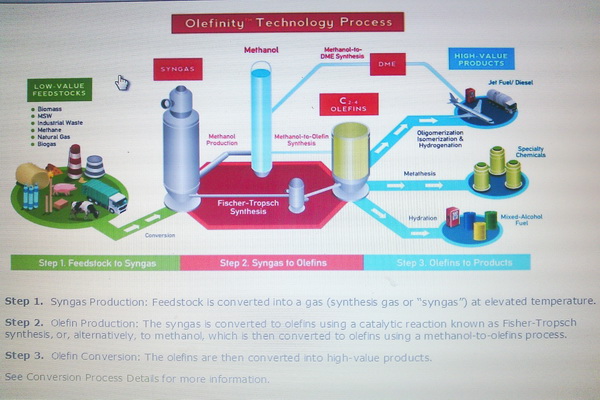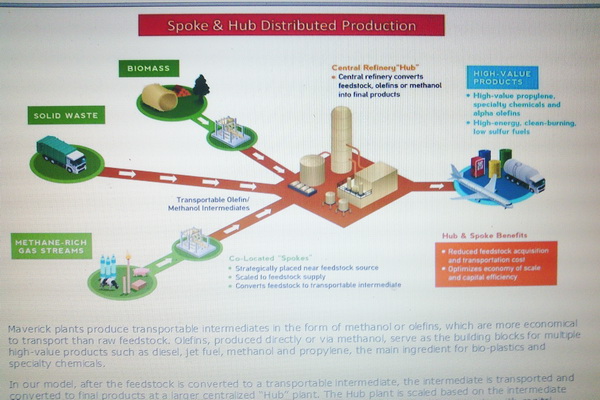7 July 2014
Details
The formation of
Maverick Northstar, Inc.,
a joint venture to facilitate
the deployment and operation of
gas-to-liquids (GTL) technology
in the Canadian Provinces of Alberta,
British Columbia and Saskatchewan.
The small-scale modular plants
will utilize and promote technology that
converts
a methane-rich feedstock,
such as natural gas, flare gas and biogas,
into high-quality methanol,
which offers new possibilities
for synthetic chemicals and fuel production
in Canada’s methane-rich prairie provinces.

Products
Maverick Synfuels uses
proven, clean-energy technology
to convert low-value feedstocks such as
* natural gas,
* purpose-grown biomass,
* waste biomass, and landfill/industrial waste
into high-value chemicals and fuels
at a relatively low overall cost.
Maverick’s primary products are
* diesel/jet fuel,
* propylene (polypropylene) and
* mixed alcohols.
Secondary products include
* methanol,
* bio-LPG, and
* heat or steam at larger refineries.

Maverick’s spoke-and-hub distributed plants
produce transportable intermediates
in the form of methanol or olefins,
which are more economical to transport
than raw feedstock.
Olefins, produced directly or via methanol,
serve as the building blocks
for multiple high-value products
such as diesel, jet fuel, methanol and propylene,
the main ingredient for bio-plastics and
specialty chemicals.
The choice of which route to take depends on
a number of factors, including
the feedstock, the location, the size of the plant, and
the product needs of the local market.
Maverick_Synfuels_Value_Proposition
Methanol:
Methane-rich feedstocks are well suited
for the production of methanol.
There is a large commercial market for methanol,
so the methanol may initially be sold to this market
while Maverick is planning or constructing central hubs.
Diesel/Jet Fuel:
Maverick’s diesel and jet fuels are
clean burning low sulfur fuels that,
when blended, meets all required ASTM standards.
Propylene:
Whether we initially produce a mixture of olefins,
or convert methanol to a mixture of olefins,
we have patent-pending processes
to convert the mixture to
pure propylene.
Because this propylene can be derived
from bio-based feedstocks,
the resulting polypropylene is
a bio-based polymer
with the same properties as
crude oil-derived polypropylene.
Mixed-Alcohol:
With 80-85% of the energy of gasoline,
Maverick’s mixed-alcohol biofuel is
a superior replacement for ethanol in gasoline blends,
and can eliminate the use of gasoline
in flexible-fuel vehicles.
Maverick’s mixed-alcohol biofuels are
cleaner-burning than gasoline, and
are distribution-channel friendly.
Unlike first generation ethanol-based biofuels
that rely on edible feedstocks,
Maverick’s gasification-based process can
convert biomass in the form of
wastes (crop, timber, landfill, etc.) or
purpose-grown feedstocks
(such as Switchgrass, Miscanthus, and other grasses)
into biofuels, and
conventional feedstocks,
such as natural gas, into alternative fuels.
Bio-LPG:
Some of our processes also produce
a by-product that has the energy density of
liquefied petroleum gas (LPG).
Because the boiling point of this product is significantly
lower than that of our other products,
this by-product can be easily obtained and
shipped to a variety of end-users.
For example, the LPG-like product can be used
to heat homes, as a cooking fuel, and
as a transportation fuel.

WWW.CHEMWINFO.COM BY KHUN PHICHAI














